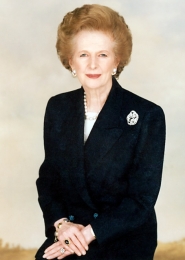ANC and SF at odds over death of ex British PM
The African National Congress (ANC) in South Africa and Sinn Féin have issued strikingly different responses to the death of controversial former British Prime Minister Margaret Thatcher, who died following a stroke on 8 April.
In a statement released by ANC national spokesperson Jackson Mthembu, the party expressed “sadness” upon learning of Thatcher’s death, despite the fact that she had described Mandela’s ANC as “terrorists” during her reign at Downing Street from 1979 to 1990.
Sinn Féin president Gerry Adams expressed no sadness or condolences in relation to Thatcher’s passing and said she would be “especially remembered for her shameful role during the epic hunger strikes of 1980 and ’81”.
Thatcher was widely accused of not doing enough to halt the hunger strikes in which prisoners were campaigning for political status, and which resulted in the death of 10 men and the radicalisation of Republicanism.
The ANC acknowledged that it had been on the “receiving end” of Thatcher policy “in terms of refusing to recognise the ANC as the representatives of South Africans and her failure to isolate apartheid after it had been described as a crime against humanity”.
Nevertheless, it described Thatcher as “one of the strong leaders in Britain and Europe” and saw her death as signalling the end of “a generation of leaders that ruled during a very difficult period characterised by the dynamics of the Cold War”.
The statement concluded that the ANC “extends its condolences to her family, her loved ones and the people of Britain. May her soul rest in peace!”
As leader of the opposition in 2006, current Conservative Prime Minister David Cameron said it was wrong to have branded the ANC as ‘terrorists’ and to have opposed sanctions against the apartheid regime in South Africa.
Adams, meanwhile, underlined the “great hurt” that Thatcher inflicted on Irish and British people.
“Working class communities were devastated in Britain because of her policies,” he said, adding that her “failed efforts to criminalise the Republican struggle and the political prisoners” is part of her legacy.
During the 1980s, Thatcher was an assassination target for the IRA, which nearly succeeded in killing her in the deadly Brighton bomb blast in 1984.
“It should be noted that in complete contradiction of her public posturing, she authorised a back channel of communications with the Sinn Féin leadership but failed to act on the logic of this,” said Adams.
“Unfortunately she was faced with weak Irish governments who failed to oppose her securocrat agenda or to enlist international support in defence of citizens in the North.”












